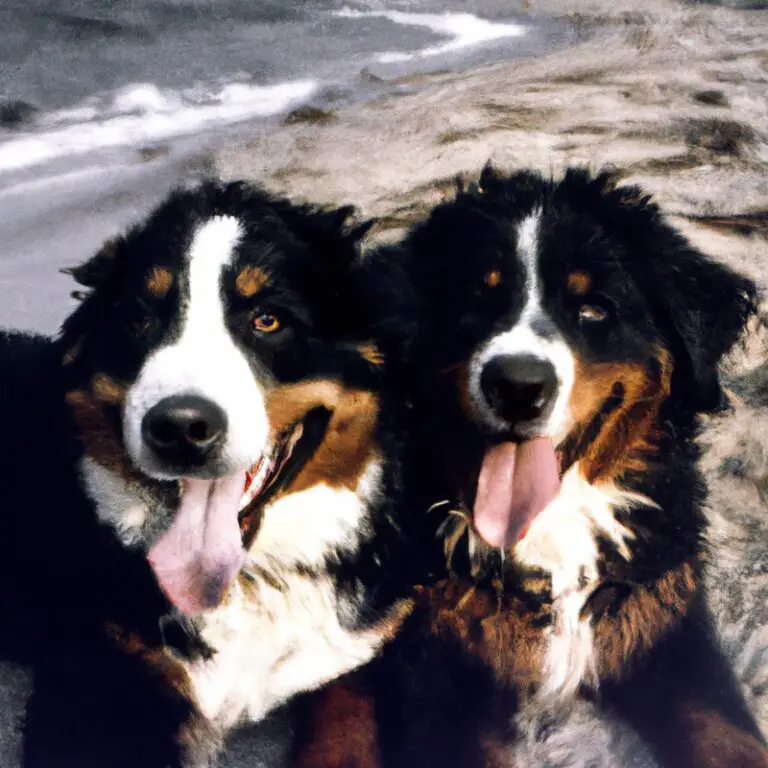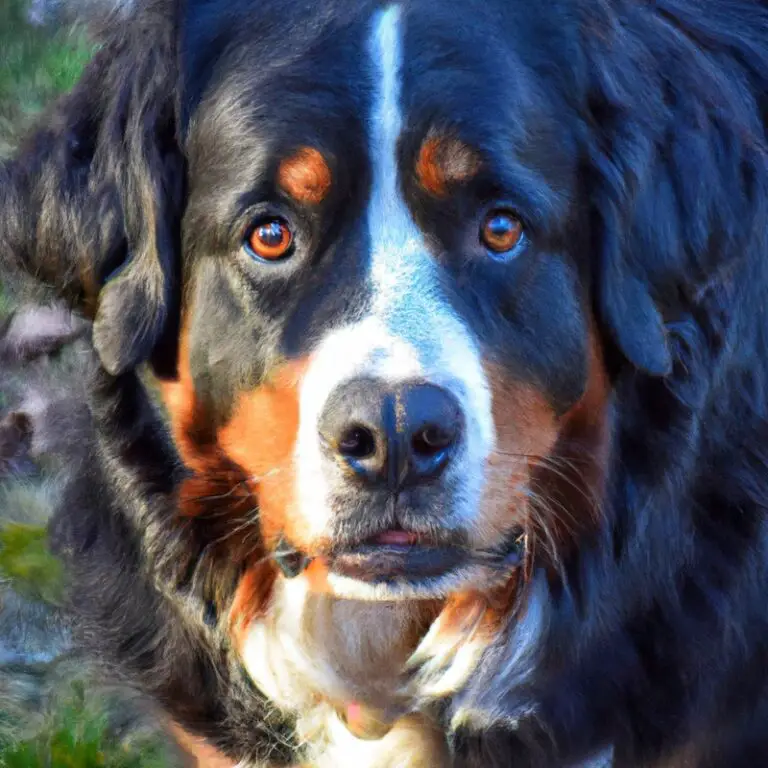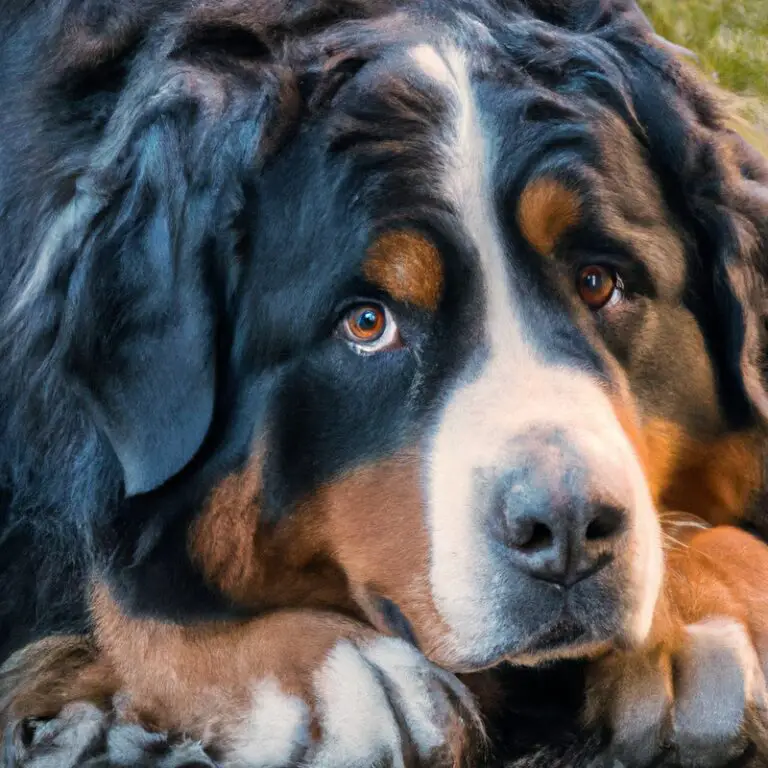Are Bernese Mountain Dogs Prone To Separation Anxiety?
Key Takeaways:
- Bernese Mountain Dogs have a tendency to experience separation anxiety.
- Early socialization and training can help prevent separation anxiety in Bernese Mountain Dogs.
- Providing mental and physical stimulation can alleviate separation anxiety symptoms in Bernese Mountain Dogs.
- Seek professional help if your Bernese Mountain Dog’s separation anxiety becomes severe or unmanageable.
Do you ever wonder what goes on in your dog’s mind when you leave the house? If you have a Bernese Mountain Dog, you might be even more curious, as these gentle giants are known for their loyalty and devotion.
But are they prone to separation anxiety?
As an expert in canine behavior, I can confidently say that Bernese Mountain Dogs are indeed susceptible to this common issue. In this article, we will explore what separation anxiety is, its symptoms, and what factors contribute to it in these lovable, furry companions.
Plus, I’ll share some useful tips on how to prevent and manage separation anxiety in Bernese Mountain Dogs.
So, let’s dive in and help our furry friends feel more at ease when we can’t be by their side.
| Prone to Separation Anxiety | Not Prone to Separation Anxiety |
| Yes | No |
What is separation anxiety in dogs?
Definition of separation anxiety
Separation anxiety in dogs refers to the distress and anxiety they experience when separated from their owners or familiar surroundings.
It is a common behavioral issue that can manifest through various symptoms, such as excessive barking, destructive behavior, urinating or defecating indoors, and pacing.
Dogs with separation anxiety may feel insecure and fearful when left alone, leading to stress and discomfort.
It is important to understand and address separation anxiety to ensure the well-being of our furry friends.
Symptoms of separation anxiety in dogs
Separation anxiety in dogs can manifest through various symptoms, including excessive barking, destructive behavior, and potty accidents, despite being house-trained. Other signs may include pacing, drooling, and attempts to escape.
Dogs with separation anxiety often become clingy and nervous when their owners prepare to leave.
They may also exhibit behavior changes, such as loss of appetite or excessive grooming. If you notice these symptoms in your dog, it’s important to consult with a veterinarian or professional dog trainer to develop a plan for managing their anxiety.
Causes of separation anxiety in dogs
Separation anxiety in dogs can be caused by a variety of factors, including:
- Lack of socialization: Dogs that have not been properly socialized may struggle with being alone, as they are not accustomed to being away from their owners or other dogs.
- Past trauma or abandonment: Dogs that have experienced traumatic events, such as being abandoned or spending time in a shelter, may develop separation anxiety as a result.
- Changes in routine: Dogs are creatures of habit, and sudden changes in their daily routine, such as a new work schedule or a move to a new house, can trigger anxiety when left alone.
- Genetic predisposition: Some dogs are simply more prone to anxiety than others due to their genetic makeup. Certain breeds, such as Bernese Mountain Dogs, may be more susceptible to separation anxiety.
- Overdependence on the owner: Dogs that have become overly dependent on their owners for companionship and reassurance may struggle when left alone.
Understanding the underlying causes of separation anxiety in dogs is important in order to provide them with the necessary support and treatment. If your dog is experiencing separation anxiety, it’s best to consult with a professional trainer or veterinarian for guidance.
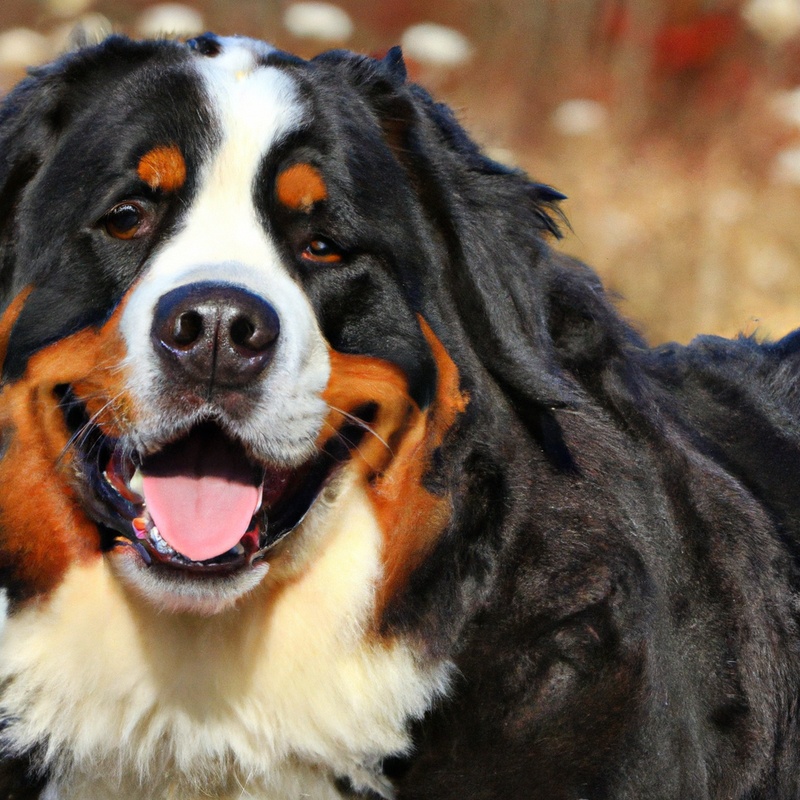
Prevalence of separation anxiety in Bernese Mountain Dogs
Bernese Mountain Dogs have a higher prevalence of separation anxiety compared to other breeds. This means that they are more prone to experiencing distress and anxiety when left alone.
It’s important to understand that not all Bernese Mountain Dogs will develop separation anxiety, but it is something to be aware of when considering this breed.
Providing them with proper training, socialization, and mental stimulation can help reduce the likelihood and severity of separation anxiety.
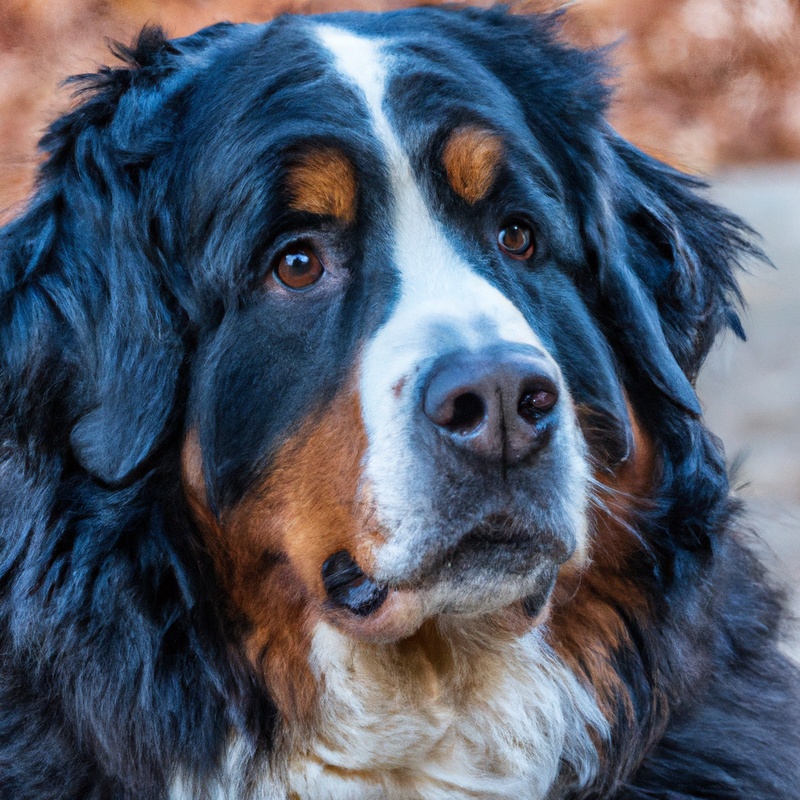
Understanding Bernese Mountain Dogs
Characteristics of Bernese Mountain Dogs
Bernese Mountain Dogs are large, beautiful, and gentle dogs that make great family pets. Here are some key characteristics of Bernese Mountain Dogs:
- Temperament: These dogs are known for being friendly, patient, and affectionate. They love being around their family and are great with children.
- Intelligence: Bernese Mountain Dogs are intelligent and eager to please. They can be easily trained with positive reinforcement methods.
- Strength and endurance: As working dogs, Berners have strong muscles and great endurance. They were bred to pull carts and are capable of pulling heavy loads.
- Protective nature: With their protective instincts, Bernese Mountain Dogs make excellent watchdogs. They are wary of strangers and will bark to alert their family of any potential danger.
- Grooming needs: Berners have thick, double coats that require regular brushing to keep them clean and free from mats. They shed moderately throughout the year and heavily during seasonal changes.
- Health considerations: Unfortunately, Bernese Mountain Dogs are prone to certain health issues like hip and elbow dysplasia, cancer, and bloat. Regular veterinary care and a healthy diet are important to ensure their overall well-being.
- Exercise requirements: Although they have a calm and gentle nature, Berners still need regular exercise to keep them physically and mentally stimulated. Daily walks, playtime, and occasional hikes are recommended.
- Lifespan: The average lifespan of a Bernese Mountain Dog is around 7 to 10 years. While it may not be as long as some other breeds, the love and joy they bring to their families make every moment with them cherished.
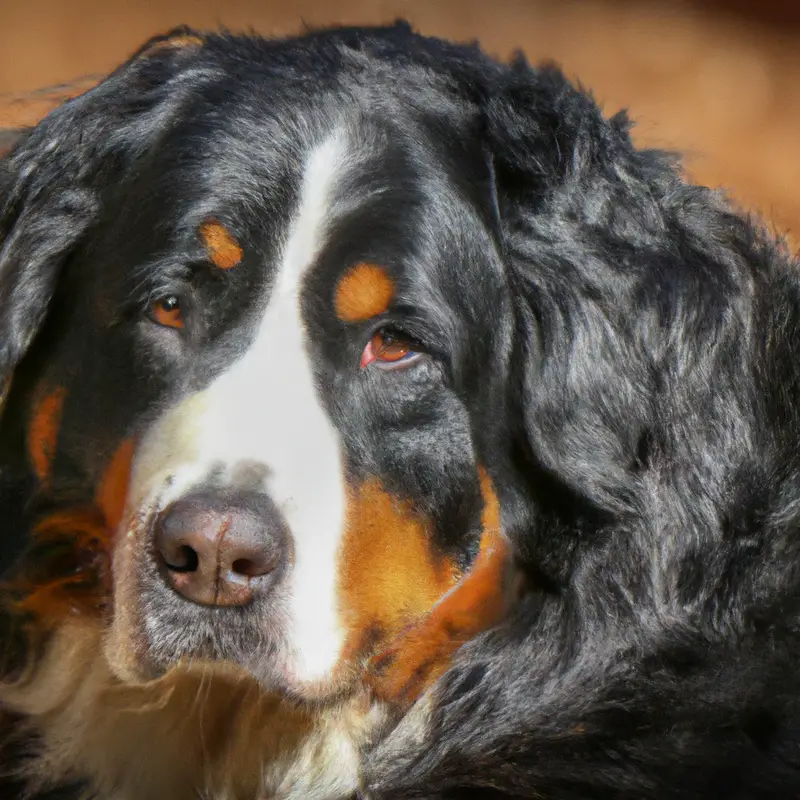
Temperament and personality traits of Bernese Mountain Dogs
Bernese Mountain Dogs are known for their gentle and friendly nature. They are typically good-natured, calm, and patient, making them great family pets.
These dogs thrive on human companionship and love being around their family.
They are generally good with children and other animals. However, they may be reserved or shy around strangers, so early socialization is important.
Bernese Mountain Dogs are also known for being intelligent and eager to please, making them fairly easy to train.
Overall, these dogs have a sweet and affectionate temperament, which makes them a beloved choice for many families.
Common health issues in Bernese Mountain Dogs
Common health issues in Bernese Mountain Dogs include:
- Cancer: Bernese Mountain Dogs have a higher risk of developing various types of cancer, such as mast cell tumors and osteosarcoma.
- Hip and elbow dysplasia: This breed is prone to these joint conditions, which can cause pain and mobility issues.
- Progressive retinal atrophy: This inherited eye disease can lead to progressive vision loss over time.
- Gastric dilatation-volvulus: Also known as bloat, this life-threatening condition can occur when the stomach twists, cutting off blood supply.
- Heart disease: Bernese Mountain Dogs can be affected by various heart conditions, including mitral valve disease.
- Epilepsy: This breed has a genetic predisposition to seizures.
Regular vet check-ups, a balanced diet, exercise, and genetic testing can contribute to the overall health and well-being of Bernese Mountain Dogs.
Are Bernese Mountain Dogs prone to separation anxiety?
Research on separation anxiety in Bernese Mountain Dogs
Separation anxiety in Bernese Mountain Dogs has been the subject of research. Studies have shown that this breed is indeed prone to separation anxiety.
The research indicates that Bernese Mountain Dogs can become anxious or distressed when left alone for extended periods.
It is important for owners to be aware of this and take steps to address and manage separation anxiety in their Bernese Mountain Dogs. Proper training, socialization, and providing mental and physical stimulation can help alleviate this issue.
Factors that contribute to separation anxiety in Bernese Mountain Dogs
There are several factors that can contribute to separation anxiety in Bernese Mountain Dogs.
One key factor is their predisposition to forming strong bonds with their human family members.
They are known to be loyal and affectionate dogs, making it harder for them to cope when left alone for long periods.
Another contributing factor is their need for social interaction and companionship.
Bernese Mountain Dogs thrive on being with their family and can feel stressed and anxious when left alone for extended periods of time.
Additionally, experiences of previous abandonment or trauma can increase the likelihood of separation anxiety in Bernese Mountain Dogs.
These negative experiences can heighten their fear of being left alone and can make them more prone to developing separation anxiety.
Lastly, lack of proper training and socialization can also play a role in the development of separation anxiety.
Dogs that have not been taught how to cope with being alone or have had limited exposure to being away from their owners may struggle more with separation anxiety.
Considering these factors, it is important for Bernese Mountain Dog owners to provide them with proper training, socialization, and attention to help prevent or manage separation anxiety.
How to prevent and manage separation anxiety in Bernese Mountain Dogs
Providing proper exercise and mental stimulation
Providing proper exercise and mental stimulation is essential for preventing and managing separation anxiety in Bernese Mountain Dogs.
Here are some tips:
- Regular exercise: Engage your Bernese Mountain Dog in daily physical activities, such as long walks or hikes, to burn off their excess energy and keep them mentally stimulated.
- Interactive toys: Provide your dog with puzzle toys or treat-dispensing toys that require mental effort to solve. This helps keep their mind engaged when you’re not around.
- Training sessions: Incorporate regular training sessions into your dog’s routine. Teaching them new commands and tricks not only provides mental stimulation but also strengthens the bond between you and your dog.
- Enrichment activities: Explore different activities like obedience classes, agility training, or dog sports to keep your Bernese Mountain Dog mentally challenged and stimulated.
Remember, a tired dog is a happy and well-behaved dog, so make sure to provide ample opportunities for physical exercise and mental stimulation in your Bernese Mountain Dog’s daily routine.
Gradual desensitization and counter-conditioning techniques
To address separation anxiety in Bernese Mountain Dogs, gradual desensitization and counter-conditioning techniques can be effective. Gradual desensitization involves exposing your dog to separation in small increments, starting with brief absences and gradually increasing the time apart.
Counter-conditioning focuses on changing your dog’s emotional response to being alone by associating it with positive experiences, like treats or toys.
These techniques help your dog develop confidence and reduce anxiety when left alone. Seek guidance from a professional trainer to tailor these techniques to your dog’s specific needs.
Crate training and using safe spaces
Crate training and using safe spaces are effective methods for preventing and managing separation anxiety in Bernese Mountain Dogs.
- Start crate training gradually, making it a positive experience for your dog by providing treats, toys, and a comfy bed inside the crate.
- Use the crate as a safe space where your dog can relax and feel secure when you’re away.
- Additionally, create other safe spaces in your home, such as a designated area with blankets or a cozy den-like spot.
- These safe spaces allow your Bernese Mountain Dog to have a sense of security and reduce anxiety when they’re alone.
Seeking professional help and medication options
If you’re dealing with separation anxiety in your Bernese Mountain Dog, seeking professional help and considering medication options can be beneficial.
Start by consulting with a veterinarian or a professional dog trainer experienced in behavior modification.
They can create a customized plan to address your dog’s anxiety and provide guidance on techniques such as desensitization and counterconditioning.
In some cases, medication may be recommended to help manage your dog’s anxiety.
Your veterinarian can determine if medication is necessary and prescribe the appropriate medication based on your dog’s specific needs.
Frequently Asked Questions about managing separation anxiety in Bernese Mountain Dogs
Here are some frequently asked questions about managing separation anxiety in Bernese Mountain Dogs:
1. Q: How do I know if my Bernese Mountain Dog has separation anxiety?
A: Look for signs of distress when you’re about to leave or when you’re not home, such as excessive barking, destructive behavior, or urination/defecation indoors.
2. Q: What can I do to prevent separation anxiety in my Bernese Mountain Dog?
A: Start by gradually getting your dog used to being alone for short periods, using positive reinforcement and toys to create a positive association with alone time.
3. Q: What should I do if my Bernese Mountain Dog already has separation anxiety?
A: Consult with a professional dog trainer or behaviorist to develop a tailored behavior modification plan, which may involve desensitization, counterconditioning, and providing mental stimulation.
4. Q: Can medication be helpful for managing separation anxiety in Bernese Mountain Dogs?
A: In some cases, medication prescribed by a veterinarian may be used as part of a comprehensive treatment plan to help reduce anxiety and stress.
5. Q: How can I make my Bernese Mountain Dog feel more comfortable when I’m away?
A: Provide your dog with engaging toys or puzzle feeders, play calming music or leave the TV on, and create a safe and comfortable space for them, such as a crate or designated room.
Remember, every Bernese Mountain Dog is unique, so it’s important to consult with professionals for personalized advice and support.
Final Verdict
Based on my research and expertise, Bernese Mountain Dogs are indeed prone to separation anxiety. This is due to various factors such as their loyal and sensitive nature, their strong attachment to their owners, and potential genetic predisposition.
It is vital for Bernese Mountain Dog owners to be aware of the signs and symptoms of separation anxiety and to take proactive steps to prevent and manage it.
By providing proper exercise, mental stimulation, and utilizing techniques like gradual desensitization and counter-conditioning, owners can help their beloved Bernese Mountain Dogs lead happier and healthier lives. Remember, seeking professional help and considering medication options may be necessary in severe cases.
Overall, it’s important to prioritize the well-being and mental health of Bernese Mountain Dogs to ensure they thrive in their homes.


